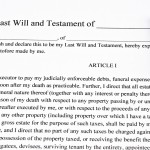
The Cost of Filing Chapter 7 Bankruptcy
Those considering Chapter 7 Bankruptcy don’t want to pay a dime more than they need to for attorney services and in fact, some attempt the process on their own or with the help of petitioner preparers. Here is a review of what you get for each method:
Filing on Your Own
Positives – The cheapest option. You can get the forms from Bankruptcy Court and their website offers some information. A detailed oriented person who is willing to get through the paperwork very carefully and attend a hearing can sort through it, particularly if the case is fairly simple with no assets and not a huge amount of debt. I have seen well prepared debtors get through their 341 hearing fairly well, but most often, their cases were quite simple and they were very well organized.
Negatives – It’s necessary to complete a Petition, Statement of Financial Affairs and Schedules A-J – that’s a lot of paperwork and it’s easy to make errors. There can’t be contradictions between the schedules, for example. At hearing, Trustees ask a variety of questions that can be confusing. There are often problems because the paperwork wasn’t done correctly. More importantly, debtors sometimes lose assets or have their case dismissed because they did not understand what was required.
Using Upsolve
Positives – Free and they provide the forms and the software to generate them.
Negatives – They can’t give you advice unless you contact one of the attorneys on their site. This can lead to forms that are incorrect or assets taken and sometimes a case gets dismissed. You could consult with an attorney that will review their forms and give you advice (I do this, many attorneys don’t).
Filing with Petitioner Preparers
Positives – Less costly than any attorney and they provide the forms.
Negatives – Some preparers just give you the forms, which you could have gotten from the Court for free. Others fill them in for you. None of them go to court with you for the hearing. They are not supposed to offer advice, which is just as well because when they give advice, it is often wrong. I have watched as trustees took people’s car keys or told them they would lose their home because the debtor got advice that was wrong. Usually the debtor protests that the petition preparer told them they could keep it – the trustee usually suggests they tell the petition preparer they were wrong.
Filing with a Bargain Attorney ($499 or less!)
Positives – Less costly than other attorneys, they provide the forms and usually assist in filling out the forms and they do file the forms. They usually go to the hearing with you. If they do, they have your file with them and are able to be of some assistance if there’s a problem.
Negatives – In order to offer low prices, an attorney usually needs to file a lot of bankruptcies each month. That means that they cannot spend much time with any client, which means that their understanding of your situation is limited and their advice is sometimes quite limited. It can also mean bad advice, errors in your paperwork and problems at hearing because the attorney didn’t have time to fully understand your situation, research unusual aspects of your case or review the paperwork to make sure it was correct. It also means that individual debtors forfeit money at hearing based on when the case was filed. This happens because there is an optimal filing time for any client, but if the attorney is filing all his or her cases for the month for one day, then they can’t file on a certain day to save a client money. This can result in an odd situation where the money you saved hiring a cheaper attorney is lost, because of the errors made or because of the date filed. An example is that the trustee gets to keep 25% of whatever is in your bank accounts and whatever an employer owes you on the date of filing. So, if the case is filed the day your paycheck is filed, the trustee gets 25% of that check. Also, if the attorney didn’t advise the client carefully, they may have just received $1,000 from a family member who was trying to help and lose 25% of that amount. Other, more serious mistakes occur when the attorney has spent very little time with the client, since this means they may not understand the client’s job, assets or certain debts that result in having the case dismissed for fraud and the debtor charged with a felony.
Another problem can be that the attorney is inexperienced. While waiting for my most recent hearing, I saw an attorney who had three cases and none of them passed the means test. In fact, the means test submitted was blank (the attorney said it was a software problem, but frankly, this isn’t one of the problems with the software). The trustee did some calculations and these people didn’t appear to be eligible to file. Whatever process this attorney was using didn’t catch the math problem, which means these people will have their case thrown out.
Filing with a Moderate Priced Attorney – (Usually around $2,000 for a single filer and around $2500 married filing together)
Positives – Less costly than the higher priced attorneys, they will assist you on the paperwork and advise on a variety of issues that you have to know to file successfully. They can often offer fast turn around time if you have creditors after you because they are in a position to file when it best assist you. They deal with problem creditors before, during, and after the hearing and they will take your calls and answer any questions or concerns you have. They go to the hearing with you, and have back-up information so that they can assist if the trustee needs additional information and they jump in if there is a problem.
Negatives – They cost more money than some alternatives and they rarely do highly sophisticated cases where the issues are complex without charging you more money.
Filing with a Higher Priced Attorney – (Usually $2,500+ for a single filer and $3,000+ married filing together)
Positives – Some cases are complicated because of the amount of assets and/or debts or because there are difficult or unusual legal issues involved. An experienced attorney who specializes in such cases will recognize the various hazards and steer the client through them successfully. They deal with problem creditors before, during and after the hearing and they will take your calls and answer any questions or concerns you have. This actually can be quite challenging if there are serious issues going on with your case but that’s why you needed them. They are extremely careful with the paperwork since it will be more difficult to do properly. They will go to the hearing prepared to do a difficult hearing and if necessary, they will do other hearings to handle your case.
Negatives – They cost more money than any of the other alternatives and you have to work very closely with them to get a good result. This means they may call you often to get other documents or information, they may have quite a few follow-up questions, and they will demand a high level of effort because that is what it will take to get you safely through the bankruptcy process. Sometimes, the ones who are best able to take on a trustee or argue successfully with a judge are not the best when it comes to reassuring stressed-out clients (but not always).
By Way of Comparison:
Our law offices are in the moderate category. We spend a fair amount of time getting to know what our client has by way of income, assets and debts. We want to be sure we understand so as to avoid problems and offer good advice. We spend a fair amount of time explaining what the client should or should not do before they file and during the bankruptcy process as well as afterward. We look at what else is happening in the client’s life to be sure there are no conflicts, since we are in general practice and are aware of some of the conflicts with other areas (such as divorce, probate, etc.). We do the forms with information we get from the client, but go back and forth with them to be sure the details are correct and we get back-up information for our files in case we need them at hearing. We file the case on the date where there will be the least cost for the client and watch for other areas where the client would lose money or assets. We do a pre-hearing prep meeting to review potential problem areas and run through exactly what will happen at hearing. At the hearing we are ready with any back up information and documents the trustee might need, as well as to assist the client if they get stuck. After the hearing, if anything is needed on your case, we continue to provide advice and assistance, sometimes years afterwards. (For example, if a creditor calls them three years later we provide proof the bankruptcy was filed and successfully completed).



